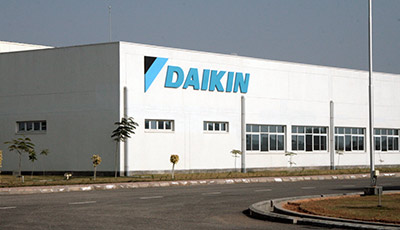Advantage R290 and R32 in battle for India
22nd November 2014Air conditioning manufacturers using alternative refrigerants like propane and R32 will have a marked competitive edge in India, according to a new report.
While India is still seen to be dragging its feet over supporting global HFC phase-downs through the Montreal Protocol, the use of alternative climate-friendly low GWP refrigerants are rapidly expanding in the Indian market.
Rising prosperity and the expansion of the electrical grid is resulting in an exponential increase in use of room air conditioning in India. Air conditioning use is already the largest component of overall residential power consumption and the largest peak demand use of electricity in many Indian cities. The current relatively low penetration of around 4,000,000 room air conditioners in India is expected to increase at a rate of about 15% per year. By 2030, it is estimated that air conditioning use will add 80-145GWh to India’s peak electricity demand.
 According to new research by the Indian Council on Energy, Environment and Water (CEEW) and Natural Resources Defense Council (NRDC), companies marketing air conditioners with low GWP refrigerants could be at a competitive advantage. Daikin is producing air conditioners with R32 and is reporting sales of 150,000 units in India since introduction in 2013 and 3,000,000 units sold worldwide. Indian manufacturer Godrej & Boyce is leading the way on production of air conditioners using the hydrocarbon refrigerant R290 (propane), reporting sales of 100,000 units.
According to new research by the Indian Council on Energy, Environment and Water (CEEW) and Natural Resources Defense Council (NRDC), companies marketing air conditioners with low GWP refrigerants could be at a competitive advantage. Daikin is producing air conditioners with R32 and is reporting sales of 150,000 units in India since introduction in 2013 and 3,000,000 units sold worldwide. Indian manufacturer Godrej & Boyce is leading the way on production of air conditioners using the hydrocarbon refrigerant R290 (propane), reporting sales of 100,000 units.
Refrigerants produced with alternate refrigerants such as HFC-32 and HC-290 can be more energy efficient, says the CEEW report, especially at high ambient temperatures such as in India. A Godrej R290 air conditioner has received a five star energy-efficiency rating – the highest available rating award by India’s Bureau of Energy Efficiency (BEE). In 2012, the Daikin R32 room air conditioner earned the grand prize for excellence in energy efficiency and conservation in Japan as the most energy efficient device of its class on the market.
No patents exist for the production and use of propane and Daikin has made R32 royalty-free to companies in India which will keep air conditioner costs down and promote wider adoption of the technology.
Several other companies – Mitsubishi, Fujitsu General, Hitachi, Panasonic, Toshiba, and Sharp – are also selling R32 air conditioners. Fujitsu General has launched two models in India using R32 this year, with other companies expected to follow.
Several global leading component suppliers such as, Guangdong Meizhi Compressor (GMCC), Copeland, Dalian Sanyo (Panasonic), Danfoss, Sanhua, and Saginomiya are also developing or have already announced compressors and components for use with R32.

Godrej reports sales of over 100,000 R290 units in India. The company’s manufacturing facility near Pune is said to be capable of producing 180,000 R290 air conditioners per year.
The Godrej R290 units were developed in collaboration with German development agency GIZ, and India’s Ministry of Environment and Forests’ Ozone Cell.
It is thought that, by 2050, a switch to air conditioners with lower climate-impact refrigerants could offer a 15% energy saving over a business-as-usual scenario using R410A. During that period, the switch could reduce climate change emissions from room air conditioners in India’s residential market between 31-38%.
Emerging economies such as India and China have a longer timetable to make the transition away from HCFCs and the pre-dominant room air conditioning refrigerant R22. These growing markets have an opportunity to bypass R410A and instead adopt more climate-friendly next-generation refrigerants. Several companies in developing countries have already taken advantage of free access to R32 technology and are switching to this refrigerant. The Montreal Protocol’s Multilateral Fund (MLF) has also approved projects using R32 in Thailand and Indonesia as part of their R22 phase-out plans.








